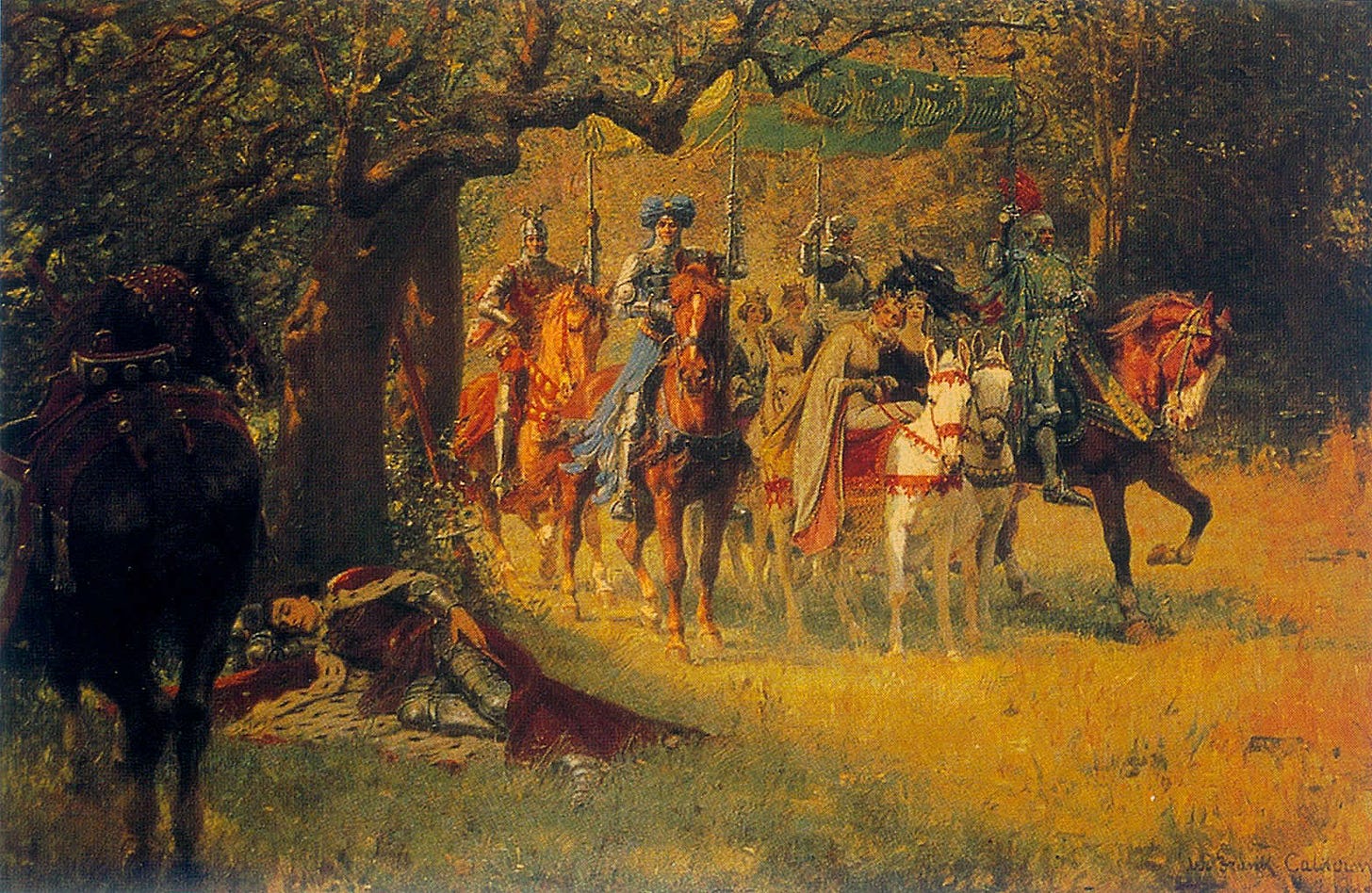Sir Gawain and Sir Hector meet up on the plains of England. They’re good friends, from Arthur’s court. You could never accuse Gawain of doing anything outrageously wicked. In fact, he seems just a strong, brave knight, faithful to his uncle, King Arthur. The problem is that he has no spiritual values whatsoever. He hasn’t made a good confession in many years. He’s a rough sort of worldling, and if it weren’t for his considerable prowess on the field, you’d say he was a dime a dozen. Hector is but Gawain without the edge.
“Have you met up with any adventures?” asks Sir Hector, using our Word of the Week. “Not a one,” says Gawain. “I’ve had some jousts, and I’ve killed a couple of people, but not an adventure to be seen. What a frustrating quest this is!” Hector agrees. Each of them that night has a dream that neither one of them can make heads or tails of. When that happens, you’ve got to put in at the next hermitage, to ask advice of the hermit. I used to tell my students that in those days, you could see signs on the road, “Next Hermit Stop, 9 Miles.” So they go there, and the hermit interprets the dreams, telling them what they don’t want to hear, but he spends a little extra time with Gawain, begging him to do penance for his sins and to get his soul right with God. “You’ve given the devil the kernel,” says the hermit, “but at least God should have the bran.” But Gawain says that he can’t suffer the trials of penance, though, really and for true, he sure does want to talk to the hermit again, you bet. And he leaves.
I’ve been paraphrasing, and having a little fun with, the wonderful 13th-century Quest of the Holy Grail, written in Old French, probably by a Cistercian monk. Our good author’s point is clear. Adventures do not come to those who are not spiritually fit to receive them. He doesn’t mean that they must have pure souls. Indeed, Sir Lancelot, whose soul has been sagging under the load of his adulterous relationship with Queen Guenevere, the wife of his best friend, his benefactor, and his lord, King Arthur, does meet with adventures, but then, he is open to them — he is open to the unmerited grace of God. He is weighed down with the feeling of guilt, and that’s at least a start. The point is that we do not make the adventure. The adventure comes to us.
Think of the meaning of the word. Advent, the season that has come once more with its call to penitence, its expectation, its danger, and its hope, suggests that something — or Someone — is coming our way: Latin res adventura, something about to arrive. I’ve often observed that insofar as we plan a thing, insofar as we determine what will happen, what we intend to look for while passing by everything else, to that same extent we stifle the adventure. In this sense, safety kills. “Set out into the deep waters,” says Jesus to the disciples after they have fished all night and come up empty. They did not want to hear that advice, but they did what he advised, and they ended up bringing in so great a haul of fish, it nearly capsized the boat.
The word adventure is an interesting one, coming to us from Latin through French. In French and Italian, that d had been lost, but it was restored in English by scholars in the sixteenth century (who also restored the b in debt, which, historically, did belong there, but who also pasted the w onto whole, where it did not). The prefix ad- comes from the same ancient root that gives us our English word at. You might think that at doesn’t imply motion toward, but think of such uses as these: to throw at, smile at, kick at, swing at. The -venture part comes from the future active participle of Latin venire, to come. That’s got all kinds of descendants in English: convene, invent, vent, and many more. What about cousins in English? Here we have to do what the scholars did, sort of, and replace a lost consonant. Words in Indo-European that began with gw- lose the g in Latin; so the root -ven, pronounced -wen, was instead gwen-, from an original root gwa-, meaning to come, or to go. Often, for obvious reasons, you’ll get a word that means come in one language, while its cousin means go in another language. That gwa- is the source of the English word come. It’s not the source of go: that comes from another root entirely. Indo-European g corresponds to English c (k): think of Latin genus, but English kin.
And maybe that’s fitting. The three saintly knights, Perceval, Bors, and Galahad, go forth on the quest for the Grail, not that they believe they can find it by their own power, but that they go out into the great spiritual world where anything may happen, and they entrust themselves to God, and await attentively what may come their way. And the adventures come.
Listen to this episode with a 7-day free trial
Subscribe to Word & Song by Anthony Esolen to listen to this post and get 7 days of free access to the full post archives.













